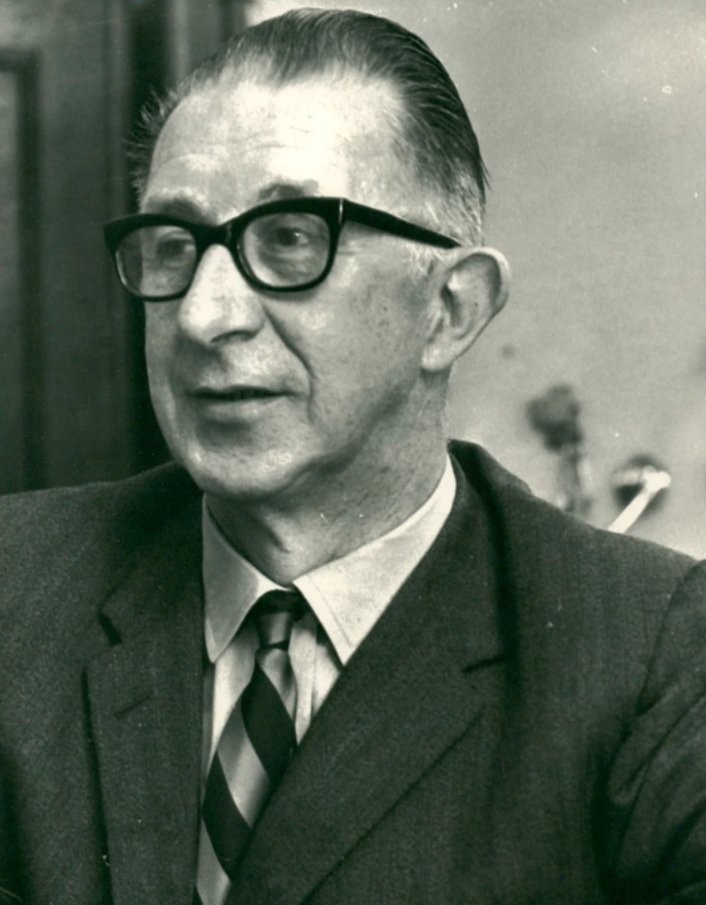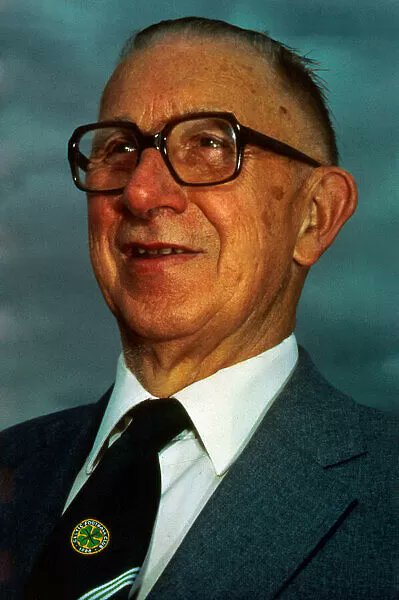| Celtic Board – Past | Celtic Board | Celtic’s Foundation | About Celtic |
Details
Board Member (1947-1985)
Chairman (Apr 1971 – Jun 1985)
Died: 1985
“His family could look at one photograph in particular only with distaste. It shows the trio of Desmond White, McNeill and Stein in the boardroom at the moment of transfer of power to the new man. For the first time in his life, offering an awkward, almost reluctant handshake to McNeill, looked like a banished and utterly inconsolable figure.”
Broadcaster Archie MacPherson on Stein
Biog
There are few other names in Celtic history as derided as that of Desmond White, on a professional basis. There is no denying his love for the club, but as the chairman at Celtic, he presided over a club in decline and held the development back.
As a footballer, he had a spell with Edinburgh City before joining Queen’s Park, for whom he was between the sticks on 16 April 1937 when Jimmy McGrory scored his last goal for Celtic.
White became Celtic club secretary in 1940, was appointed a director in 1947 and assumed the position of chairman after the death of Sir Robert Kelly in 1971.
During the war years, Desmond White, had permanently lost the use of his right arm while serving with the RAF in the Second World War.
When he took over as Chairman, the club was still going through a golden era with Jock Stein in charge, and the club were to reach the European Cup semi-finals twice, and carry on for nine league titles in a row.
Yet the club failed to take advantage off the field, and investment across the board in facilities, the stadium, players etc were not carried out. Granted there was not the huge returns as there are now from European competition, but there was still a lot of revenue earned which could have been used to help generate further income and cement Celtic as a permanent European heavyweight.
This lack of foresight saw Celtic flounder. The only major investment was the creation of the new Main Stand, which cynics say was for his cronies, and little done for all else. It actually for the time was a brilliant bit of investment and ahead of its time, but all just stopped, and the stadium was actually dilapidated.
To further show how poorly he ran Celtic, his offices for running of the club were a small set of rooms above “The Blue Lagoon” chip & fish shop down the road from Sauchiehall St!
In fairness to Desmond White, the UK at the time was in turmoil and an utter shambles, which experienced bouts of heavy unemployment, strikes, high inflation, decline and/or lack of investment. There were the oil price shocks and industrial collapse, and political strife. Few if any companies came out of all this at all well, so Celtic were hardly an exception. On the other hand, Rangers had begun a long-term plan for stadium redevelopment which was to admittedly pay dividends in the long-run, and Aberdeen were to follow. Why Celtic couldn’t have matched or kept up, is something only the old Board could answer for.
Football in the UK was poorly run until the 1990s, blighted by trouble on the field, the terraces and no real TV income. It was actually a sport in decline decimated by hooliganism & underinvestment.
One another note, if it is true that Desmond White asked for the takings from Celtic’s share of the World Championship play off in a bag and accepted Argentinian currency rather than U.S. Dollars it tells you much about his then financial acumen.

However, there are other reports to counter this, and show a smiling Jock Stein when he handed over to Billy McNeill. The transition was never going to be easy, and he was offered a role on the board. Additionally, Jock Stein’s last season was a disaster for the First Team, and change was required. Jock Stein was irreplaceable, but it’s not an option that could be dismissed else the club would fall into the same trap as with Willie Maley. Billy McNeill was a perfect man to take over on many fronts, and so Desmond White made the right decision (and a difficult one).
“To those who could look behind the facade at Celtic, it was clear that the chairman, Desmond White, who had succeeded Robert Kelly in 1976 was simply using the club as a licence to print money. The dedicated, captive support would fill the terraces and White would cream off the profits. Celtic have always had marvellous supporters, real lovers of football, people who live for the game. It means that if the club’s board are of a cynical bent the good faith of these people can be exploited mercilessly.”
Billy McNeill was appointed as Jock Stein‘s successor on 29 May 1978, having previously had spells with Clyde and then Aberdeen. He departed the club following a public row with the chairman Desmond White over the terms of McNeill’s personal remuneration. Also he complained of facilities too.
“Everything was done on the cheap, it was murder.”
– Billy McNeil
Desmond White died in 1985 while on holiday in Crete; he was 73. Certain Rangers supporters hung a disgusting banner in one of the following matches, which was uncalled for. His son was to join the board, Chris White, ousted at the end of the Celtic Takeover in 1994.
Desmond White has been heavily criticised by many, and in fairness it was correct on a professional basis. Sadly it wasn’t until the 1990’s that matters were to finally change at board level, and even then it was under some duress.
Quotes
‘He’ll roast in Hell for what he tried to do to Celtic.’
Desmond White on secretary of the SFA George Graham
“Everything was done on the cheap, it was murder.”
Billy McNeil
“His family could look at one photograph in particular only with distaste. It shows the trio of Desmond White, McNeill and Stein in the boardroom at the moment of transfer of power to the new man. For the first time in his life, offering an awkward, almost reluctant handshake to McNeill, looked like a banished and utterly inconsolable figure.”
Broadcaster Archie MacPherson on Stein
Pictures


